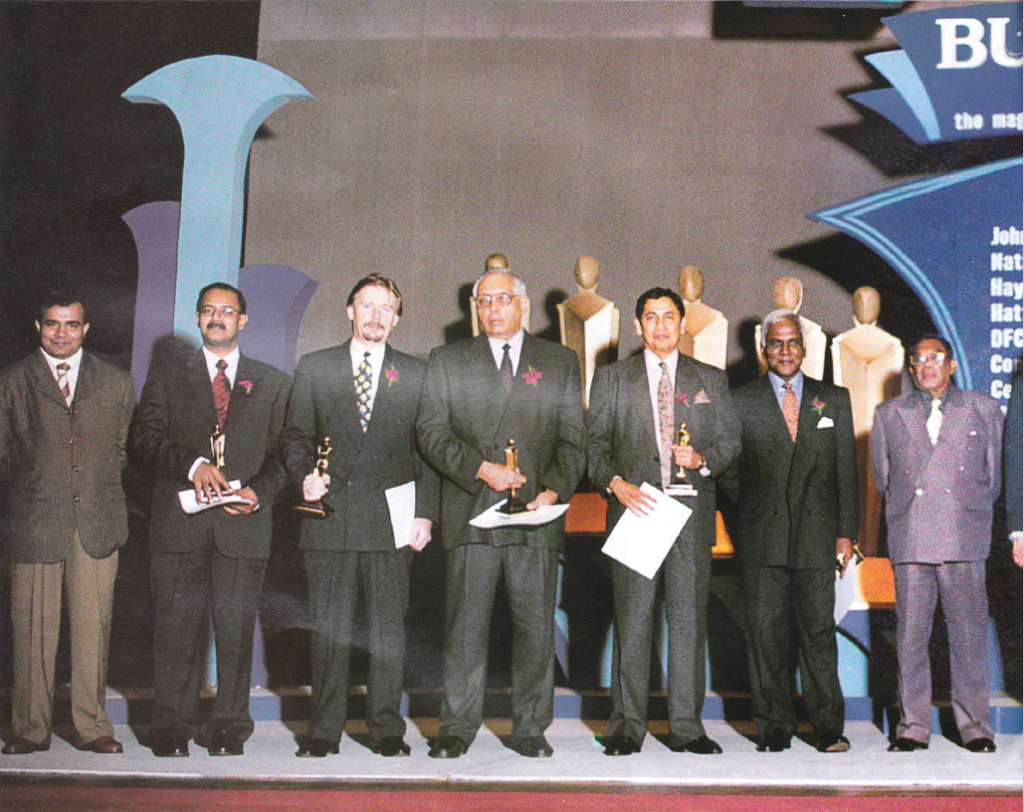
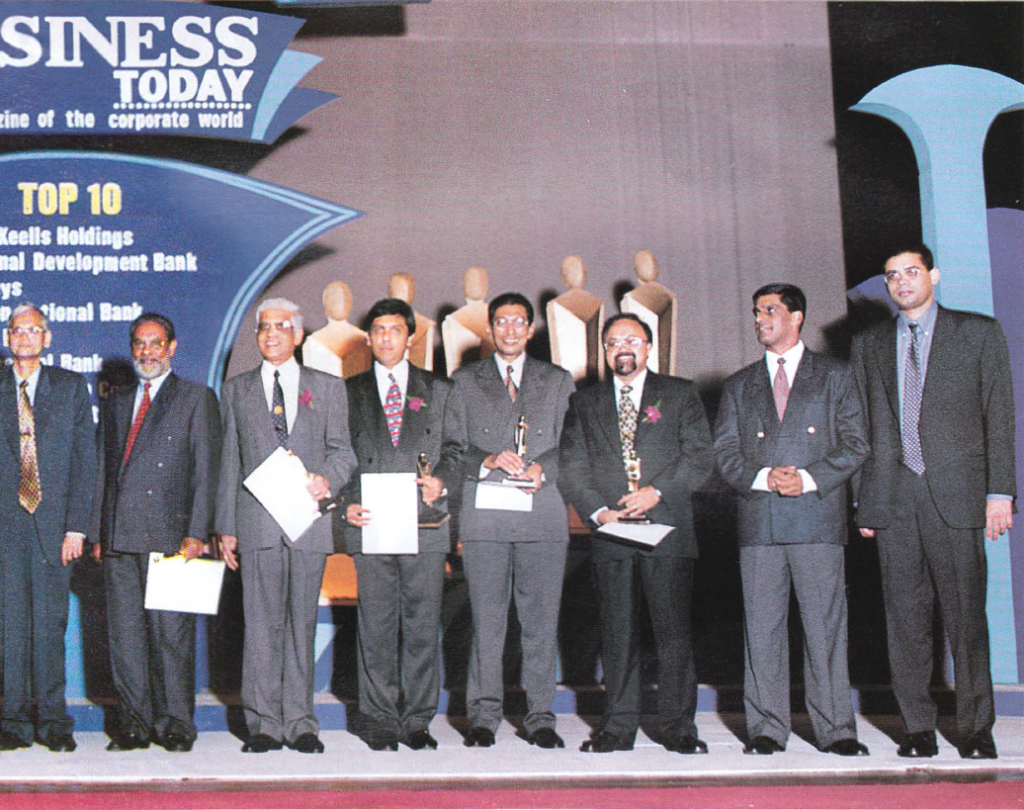
Held for the third successive year, the Business Today Top 10 awards ceremony, brought together the top most rankers in the corporate sector of the country.
Graced by the Minister of Justice, Constitutional Affairs, Ethnic Affairs, National Integration and Deputy Minister of Finance, Prof. G. L. Peiris, the Minister of Internal and External Trade, Kingsley T. Wickramaratne, the event saw excellence in financial management and contribution to social development being honored at the country’s only award ceremony of its kind.
Minister G. L. Peiris addressing the gathering recognized the decision of Business Today in honoring the corporate achievers to spur others on even greater heights of achievement and thereby enrich not merely the private sector but the Sri Lankan community in general. He saw the event as a ‘very appropriate method of strengthening and energizing the private sector.
Minister Kingsley T. Wickramaratne saw the inclusion of the criterion of social responsibility into the rating of the Top 10 companies as significant as it was a concern for the society, where the employers serve to make a company an exemplary corporate citizen and thereby contribute to the stability within the community which is an essential precondition for business success.
The Minister added that the interest created with the awards ceremony, provided wide exposure to the profiles of the winning companies’ vision of their leaders and the management practices will directly encourage the spread of good business practices in all sectors of the business community.
Indeed an event that brought together the cream of the corporate community in the country, the Business Today Top 10 awards ceremony proved a success once more, placing encouragement on the institutions in achieving excellence and contributing greater towards the community. Here we reproduce the speeches made at the award ceremony.
Speech by Dinesh Weerakkody
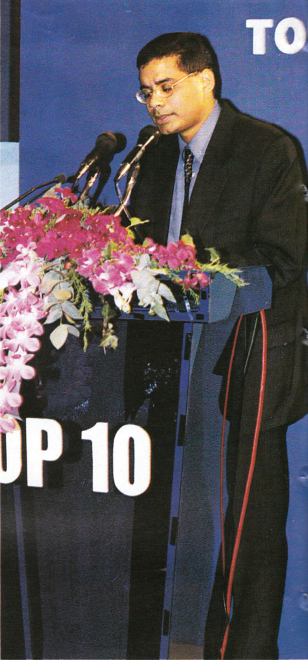
“The winners this year were undoubtedly outstanding and we observed in our survey that most of the Top 10 companies were more successful than most other companies at translating their vision into reality.”
I am honored that I have been given this opportunity to speak a few words at this ceremony, which is being held to recognize the ten outstanding companies that excelled in the year 97/98 and also to recognize the leaders of those companies. After all, institutions are no better than the people who constitute those institutions and in a competitive scenario, leadership can make the difference.
Business Today’s Top 10 is now in its third year, this year we brought in changes to capture the sentiments expressed by the winners of last year. With the support of some analysts, we refined the criteria by including value-addition and social responsibility. The weightage used was also changed to reflect the two new criteria. Social responsibility was assessed through a perception survey. We are proposing that we include more qualitative factors like innovation, leadership skills of the managers and employee perception as we progress with the Top 10.
As for selection itself, it was done by identifying the 100 most traded shares. Then we used turnover and profit to zero in. Once we had identified 25 companies we applied the 11 criteria uniformly and ranked them according to the total score. The weights were used uniformly and there was no variation whatsoever. The winners this year were undoubtedly outstanding and we observed in our survey that most of the Top 10 companies were more successful than most other companies at translating their vision into reality. Perhaps the most compelling insight was the fact that in most of the Top 10 companies their success was driven by the leadership skills of the CEOs.
While Business Today endeavors to encourage and recognize corporate achievement, our leaders in the private sector also must move beyond just running their organizations. Of course that’s their principal duty. But for the benefit of the business community and society as a whole, our business leaders must also project themselves beyond their customers. They must reach out to communicate and participate in public affairs, which we also see as an emerging trend. Today business leaders are more challenged, than they were 10 years ago. This leads me to question what does one look for in determining leadership?
Whether it is in the corporate sector, in the sphere of community welfare, or even in the sports arena many definitions are available to identify leadership and its many facets. Max De Pree in leadership as an art, states that the signs of outstanding leadership appear primarily among the followers. Are they followers reaching potential? Are they learning? Serving? Do they achieve the required results? Do they change with grace? Manage conflict? De Pree goes on to say, that leadership is a concept of owing certain things to the institution. It is a way of thinking about institutional successors, a way of thinking about stewardship as contrasted with ownership.
In order to select the Top 10 companies we too have now established accepted criteria, which we consider appropriate. We are naturally concerned with what is relevant to Sri Lanka with its own special problems and culture. We, in Sri Lanka find it an uphill task convincing the public, the bureaucracy and the politicians of the social responsibility of the business sector. It is indeed a daunting task to make people realize that as much as profits are required to sustain a business, that the community is a vital stakeholder in guaranteeing the sustenance of the organization, is always in mind in planning strategies. I do not believe that there is any organization, which is arrogant enough to ignore signals emanating from the community. On the other hand, this is the era of market research, as part of proactive planning processes.
Those who are looked up to as leaders of the business community, are not those who kill off their organizations with their munificence and philanthropy. but those who plan and implement their strategies in a way that their organizational growth and the well-being of the community go hand in hand. in such a transparent manner that all concerned not only benefit, but are also aware of the contribution made.
This leads me to comment on the sad neglect of the business community to give adequate publicity to the good things that it does for society. Often it is the failures of the organization, which get media attention and no credit is taken for the many valuable contributions made to alleviate the load of the have-nots.
Therefore, those selected for special recognition would also be organizations who have shown that they are dynamic and vibrant in terms of financial indicators, but would also be organizations which are known for their astuteness in wooing all the relevant stakeholders and having a high degree of visibility in their dealings.
One area in which some special comment is warranted is job creation. Is an employer obliged to create jobs because social pressures make it a high priority? Obviously the answer is no, but it is a conditional no. No one in his right mind will create unproductive jobs, nor will he wish to secure such jobs. The answer to the problem is therefore one which goes beyond the realm of the employer and requires a national strategy where everyone concerned does his share, in creating an environment conducive to job creation. No organization which is selected for its excellence today, is here, because of the member of jobs created, but they are certainly ones which have cemented the security of employment of those who serve them by good management practices.
I think this is a good opportunity for us to reflect on what tremendous service is possible to the community as a whole if all the stakeholders could join hands in examining what path we should tread together, in the new millennium to remove the shackles which prevent the business community from creating more jobs which in turn will lead to harmony and prosperity. The acumen of those who are here as recipients of awards combined with a reawakened and responsive community, could be the answer to the fearsome competition, which we would encounter, in the new millennium.
Before, I conclude I, wish to pay a special tribute to the CEOs and the employees of the Top 10 companies and wish them even greater success in the pursuit of their objectives and also a special word of thanks to my good friend Keith Bernard and also to Sharma Fonseka and to all those analysts who helped us to put the Top 10 selection together.
I would like to conclude, with the words of a famous Japanese entrepreneur Matsushita, who once said to a group of skeptical American executives, when they challenged him, that there was no link between profitability and social good. To quote, ‘A business should quickly stand on its own, based on the services it provides society. Profits should not be a reflection of corporate greed, but a vote of confidence from society, that what is offered by the firm, is being valued.’
Speech by Kingsley T. Wickremaratne,
Minister of Internal and International Trade and Commerce
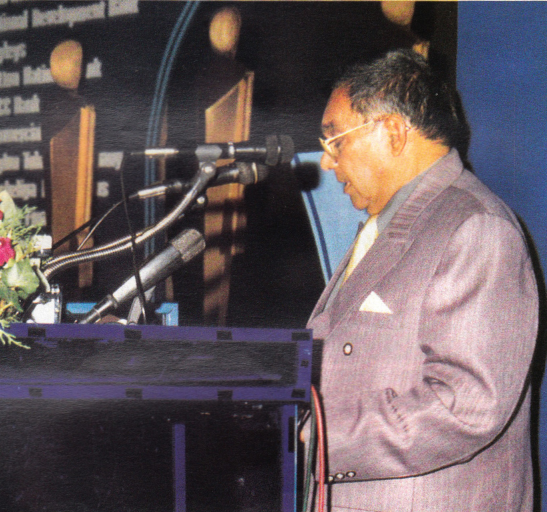
‘This prestigious ceremony recognizes the Top 10 which represents a good cross section of the captains of industry in Sri Lanka and this event gives practical expression to the lead role taken by the private sector in the development of the economy.’
We are gathered here to salute the 10 companies which have excelled in their performance in 97/98. The Business Today Top 10 awards is a token designed to honor and recognize exceptional achievements in the business world. As the third consecutive ceremony it is held today with high esteem. We must remember that man does not live by bread alone, he hungers for recognition and recognition is a driving force for greater achievement. So the Top 10 awards influence the people to move forward and become greater achievers.
What we are witnessing is the recognition of the efforts made by leading companies in the year 97/98 that excelled and stood out as high performing companies among a host of many others. These awards ceremonies are timely when we consider the government’s open economic policies and the recognition of the private sector as the engine of growth.
The organizers at Business Today in conducting this prestigious ceremony recognizes the Top 10 which represents a good cross section of the captains of industry in Sri Lanka and this event gives practical expression to the lead role taken by the private sector in the development of the economy. Our government believes that economic justice can be best viewed by free men through free enterprise within a democratic framework and we believe that the government should be of laws rather than of men.
In the world trading today there is a greater freedom of trade against the background of a world trade organization rule base international trade regime, phasing out trade restrictive measures for the tariffs and subsidies and stipulating standards of products and processes and legislation to protect intellectual property rights. By the turn of the century, the word protection would be out of the commerce dictionary and the name of the game would be competition and the three basic elements would be quality, speed of delivery and packaging or presentation. There is also the continuing concern with the environmental issues emphasizing Eco-packaging, Eco-labeling which calls industries to conform to these requirements but Eco-packaging is essential for the global good.
The development within SAARC towards SAFTA free trade and other development towards achieving these objectives such as the Indo-Sri Lanka agreement will also create both opportunities and challenges for Sri Lankan businessmen within
Sri Lanka integrating into a larger market within the South Asia region. For most products and services in September this year, the Export Development Board and the department of commerce in my ministry will be organizing a single country exhibition in Bombay, New Delhi and Madras and most of the stall holders would be those on the positive list and those who are on the negative list so that we could see what goods will be able to compete the market base and have market access.
Our manufacturing, trading and service enterprises will have to meet international competitiveness in the aggressive international markets and also the domestic Sri Lankan market facing the challenges of increasing trade liberalization of our imports trade.
Our biggest threat today is the after effects of the Asian economic crisis. Our exports have been threatened today, that’s a tremendous challenge for you because of the same goods that are in the marketplace, our goods in London that are competing with many items there with Mark and Spencer, Eaton of Canada, Grace Brothers of Australia the same goods are been threatened by Indonesia with their Rupia and with Malaysia and their Ringit and Bhat of Thailand. The same goods are sold at a lesser price. So we have to move to face this challenge, in two years’ time that challenge would be in your hands. To meet those challenges the vision and the leadership qualities of the management of the major enterprises in all sectors of the economy are of vital importance. Nationally their efforts would contribute to emulate others and encourage the development of business culture with best business practices in both Colombo and the provinces.
It is the company’s CEO or chairman who moves the company forward. It is the driving force. It is he who takes his team together. It is he who achieves. So it is important that the recognition of the company be placed on the leadership of the company. When you look at the companies the men behind the companies – Ken Balendra of John Keells to Maxi Prelis to Sunil Mendis and with Rienzie Wijetilleke – these are men with leadership. I’m aware of the quality of leadership of these people. Speaking of leadership, there are two basic factors which every leader must have, one I believe is the ability to take control of any given situation at any given time. A classic example is the Russian story where they say when Stalin died he went to heaven and tapped at the gates of heaven when Saint Peter opened the doors, he walked in and Saint Peter said nothing doing you go right down and Stalin went to hell. Three days later there was another knock at the gates of heaven. Three devils rushed in demanding political asylum. It shows ability to take control of any given situation. The second factor is the ability to recognize the core of a problem so that you could act on the core immediately and then act on the frills of the problem with ample time. A good example is one of our own people Sir Oliver Goonetilleke. It is said that when he was the municipal commissioner, the British governor phoned him one evening and told that his taps are not working and he has to attend a party and before he attends the party, he needs to have a bath. So Oliver Goonetilleke took the problem into his hand and analyzed it and was able to identify the core of the problem which was that the governor should have a bath before he attends the party. Till that evening, he couldn’t get his men to work on the pipeline so he phoned the fire brigade and asked them to pump the governor’s bathtub with water. Next day, he had ample time to work on the pipeline. When a problem arises, if we are able to act” on the core of the problem first with ample time to act on the frills of the problem, that is very important.
Today the criteria rating used to select the award winners helps to undermine the things that matter in business development. I noted that in addition to the classic criteria of turnover, growth stability, profitability and returns to shareholders two new segments of national significance has been adopted, value-addition and social responsibility. Value-addition and going upmarket unnecessarily of most of our products and services in order to be ahead of competition both locally and internationally for growth. Social responsibility which is concern for the community, the environment and the employees serve to make a company an exemplary corporate citizen and thereby contribute to the stability within the community which is an essential precondition for business success today.
The interest created in today’s event providing wide exposures to the profiles of the winning companies’ vision of their leaders and the management practices will directly encourage the spread of good business practices in all sectors of the business community.
I must congratulate the organizers of the Top 10 awards ceremony which reflects the excellent achievements of the private sector of Sri Lanka and congratulate the winners. I wish the winners all success and invite the business sector in Sri Lanka to emulate the best practices of the Top 10 award winners recognized at this prestigious event today.
Speech by Dr. Sarath M. B. Obeysekera, Managing Director,
Colombo Dockyard
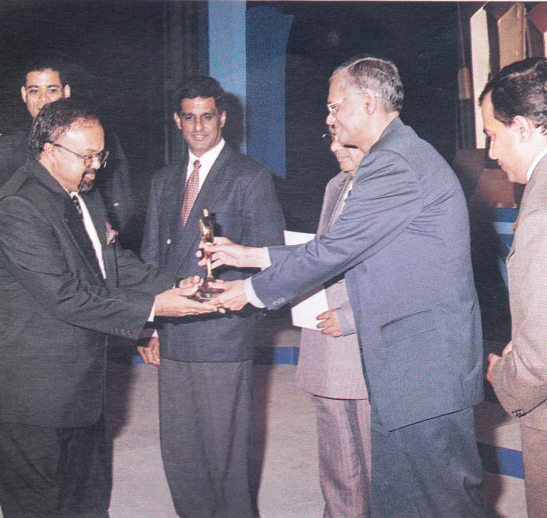
Dr Sarath M.B Obeysekera receiving the award
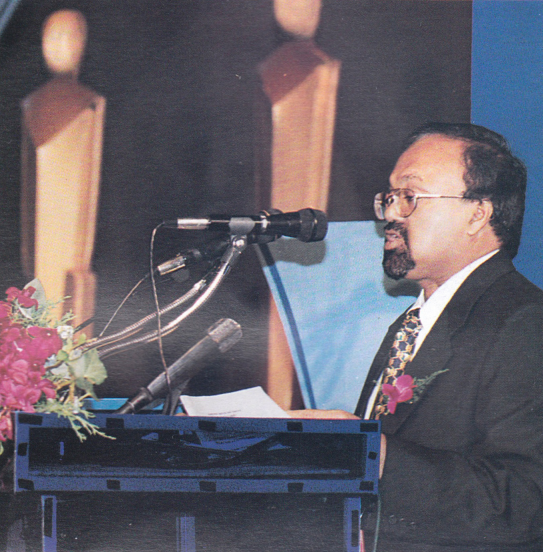
‘I am indeed proud to say that Colombo Dockyard is the one and only heavy engineering company and has been honored for the first time within the Top 10 companies.’
It gives great pleasure to speak a few words at this awards ceremony conducted by Business Today in honor of the outstanding companies in the presence of some senior members of the cabinet. I would be failing in my duty if I do not convey my appreciation to Business Today for selecting my company with the elite group of Top 10 for the first time. Our entry to one of the hot seats of the Top 10 endorses not only the pragmatic approach we adopted in the conduct of the business affairs but also the confidence of our stakeholders specially our valued customers who have confidence in us as a valued ship repairer, ship builder and a heavy engineering company in the Indian subcontinent and the South East Asian region. Indeed the scale of participation present here today reaffirms the bold steps and the validity of the criteria adopted by Business Today in the selection of Top 10 companies. Hence, I must thank Business Today once again on your report card on our company’s corporate governance and ranking is a source of inspiration to us to launch our business in a more aggressive manner in a very competitive world in the next millennium.
I am indeed proud to say that Colombo Dockyard is the one and only heavy engineering company and has been honored for the first time within the Top 10 companies. The honor and the recognition you have given us is a recognition of my fellow officers and fellow workers. This enables us to widen and diversify our business in the future and strengthen our core competencies and our march towards a bright future. With a sense of pride I inform you that the honor that you endowed us coincides with the silver jubilee of the company.
Our company was established in 1974 and in a voyage during the last twenty-five years has had many more milestones at the time of our strategic marriage with our majority shareholder Onomichi dockyard of Japan in 1993. Colombo Dockyard was a rudderless vessel drifting aimlessly in the high seas of the Indian ocean due to lack of vision and foresight. Thanks to the management skills and technical skills and the authority vested to us in the top management by the majority shareholder it has now been possible for us to achieve an appreciable growth in every aspect of shipbuilding and ship repair trade and the heavy engineering field in Sri Lanka.
I would also like to share some of my secrets of the trade with you at this juncture to show how we have achieved this prestigious place in the Top 10. During the evaluation process, we are made to understand that value-addition, social responsibility played a significant role in the selection criteria of the Top 10. Expert use of key resources I think is our benefit. I am very proud to say that the contribution to the society by our company by training skilled workers and youngsters in our country who will definitely be an asset to the development for the next millennium. Our massive workforce of 1400 permanent staff and a subcontract contingent of about 1000 workers are well educated and nurtured to be punctual, safety-conscious and therefore efficiency has improved dramatically during the past few years. I am also proud that the major trade union has also concluded the collective agreement with the management valid for three years for the second consecutive term. Secret of our success is also attributed to the carefully managed balance between labor harmony. Strict discipline augmented by work procedures, management procedures in line with ISO 9000. As the CEO of the company, myself and my colleagues do have a sense of satisfaction to see the steady improvement of quality of work during the last few years after the privatization and the colleagues who give me continuous support from Japan who are working with us in the capacity of technical advisors are also feeling the satisfaction of the quality improvement which is a driving force instrumental in achieving this prestigious position in the Top 10.
We have been continually successful in securing business in shipbuilding and ship repairing from our giant neighbor India, Iran, Maldives and all the European countries. As a matter of fact, our core competencies in shipbuilding took an upward trend after the strategic alliance with the Japanese partner and it was possible for the company to generate more sales turnover, over 3.4 billion rupees during the last year. This enabled the company to generate much needed foreign currency which the nation requires. I am happy to inform that our order book for shipbuilding and ship repairing and the heavy engineering which we are diversifying is also fairly well booked. Because of the limitation of clock facilities for ship repairs and shipbuilding. we are diversifying into heavy engineering and giving that service to the nation.
We have cemented our reputation as a leading ship repairing and shipbuilding company and also as a heavy engineering company and we are involved in building power houses. LPG tanks, petroleum tanks etc. We are now negotiating with our neighbors for building landing crafts and other building facilities. It is our fervent hope and desire to maintain our competitiveness over arch rivals in India. In the future, we hope we will be stepping into the next millennium with confidence.
Speech by Eranjith Wijenaike, Managing Director,
Central Finance
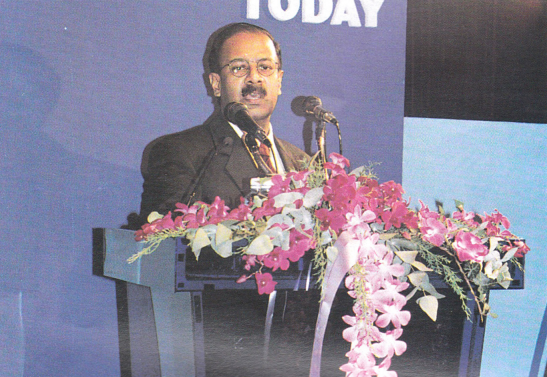
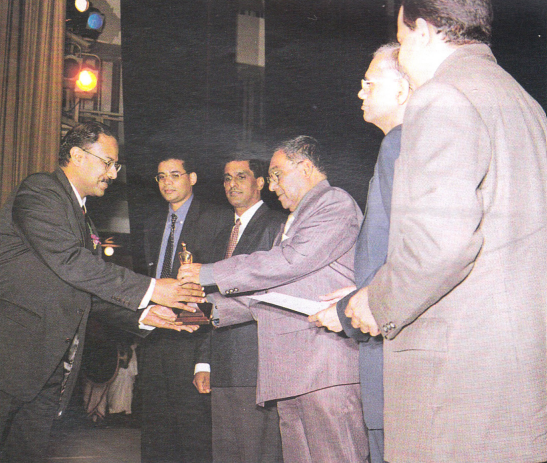
Eranjith Wijenaike receiving the award
‘A temptation to become a sprinter in pursuit of rapid growth is sometimes great and compulsive but over the years we have prudently paced our growth.’
I must thank Business Today again for selecting Central Finance as one of the Top 10 companies. It is gratifying to all of us at CF too that we have been included amongst the best in corporate Sri Lanka three years in a row. I believe that we were able to do this because we saw the achievement of 96 and 97 as the standard we have to exceed. In thinking about what to say to night I kept returning to a statement made at the last year’s speech. which I think best describes Central Finance. Ours is a business that was built absolutely on trust, confidence and prudence. Therefore, dedication to our stakeholders and to perform exceptionally well on their behalf are deeply ingrained CF values.
To my mind absolute trust confidence and prudence are the foundation stones upon which our company is based, upon which it exists and upon which it prospers. Among those stakeholders who’s trust we enjoy are our depositors. In 1998 they increased their deposits with us by 39% from Rs 3.9 billion to Rs 5. 5 billion. Central Finance now accounts for 40% of the total deposit base held by the non-bank financial institutions. Those who borrow from us are also our stakeholders, their trust and confidence in us was imply manifested because of a 16% increase in new advances during the year.
Especially satisfying is the large number of repeat customers, a tangible indication of their satisfaction with Central Finance. Our shareholders, those stakeholders with equity in the company saw earning per share increase from Rs 24.97 to 32.95. The directors recommended three dividends for the year with total payout of Rs 19.4 million. an increase of 42% over the previous year. Also, during the year, the value of shareholders’ funds increased by Rs 454 million to reach Rs 1.3 billion.
A vital group of stakeholders is our staff. We continue to provide them with significant welfare benefits and has enhanced opportunities for advancement through our management development program and we have extended our employee rewards scheme which recognizes significant individual accomplishments through all our branches in the network.
During the year we provided training for 26 unemployed graduates under the Tharuna Aruna graduate training program. Since CF began its first office in Kandy in 1957 we have followed a path of prudence. at the risk of being repetitious. I said at the year’s gathering that a temptation to become a sprinter in pursuit of rapid growth is sometimes great and compulsive but over the years we have prudently paced our growth. This has helped the company withstand whatever economic or political setbacks we have encountered.
Over the years, and throughout the country’s changing fortunes, this policy of prudence has proved to be both successful and durable. More importantly it has enabled us the absolute trust and confidence of our shareholders. depositors, borrowers, every government and the country at large. Today this policy has helped Central Finance to be counted among the Top IO companies in the country not once but three times. We see this expression of your trust and confidence as something we must maintain and build upon prudently in the years to come.
Speech by Ian Pieris, Chairman, Maskeliya Plantations
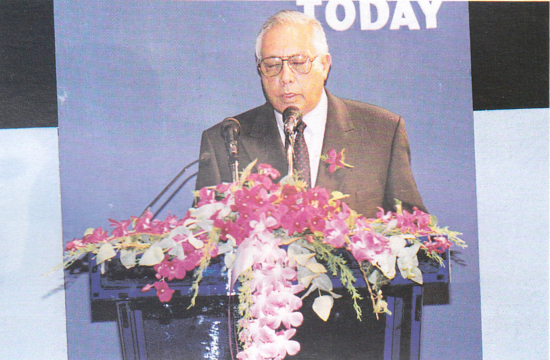
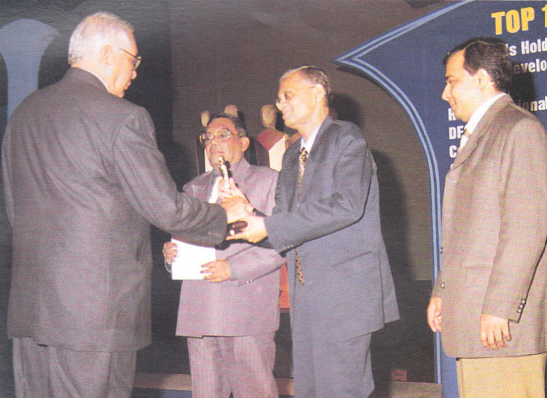
Ian Pieris receiving the award
‘Five or six years ago, who would have believed that a plantation company would reach such heights. But a succession of wise and courageous decisions by successive governments has redirected a huge potential resource into the hands of the private sector.’
As Anthony said to Cleopatra. I haven’t come here to make a speech I have instead come here to congratulate Business Today on selecting on their enlightened judgement Maskeliya Plantations into the Top 10 companies. I am hugely delighted to be present here this evening to accept this prestigious award. However, I may be here under false pretenses because I was not chairman during the year when the result promoted the selection of Maskeliya into the Top 10 and I think I would like to explain how it have come about, that I am standing here.
First, I must emphasize that I stand here as a representative of all the people who have made our success possible, the workers on the estates. the kankanis, the tea makers, the superintendents, regional directors, chief executive and so many others who have contributed so remarkably to our success, they have the great diligence and devotion and with a tremendous commitment to development and innovation lays the foundation to our success. I seize this opportunity to publicly thank them all in front of this distinguished gathering.
Actually, Maskeliya plantations is part of a group. A joint venture enterprise called RPK management services was started by an alliance between the John Keells group and the Richard Peiris group of companies. RPK not only manages two group of estates. Kegalle Plantations and Maskeliya Plantations but is also the major shareholder of both these groups of estates. When the Richard Peiris group and John Keells decided to join together into a joint venture, there were many raised eyebrows and a lot of discouraging remarks were hurled at us by a number of people and we existed in a state of disparage because it appeared to many people that here were two contrasting forces joining together. The flamboyant and global direction of John Keells joining hands together with the Richard Peiris group of companies which is more grass root level perhaps introverted and certainly had a reputation for being conservative. However, market condition perceptions are quite often wildly wrong and hopelessly inaccurate because I can tell you that it was a partnership built on the strengths of both groups of companies. Particularly in the field of exports of rubber products. We have formed together what I would like to describe as an amazingly successful partnership.
We have together forged and formed a platform from which I expect an extraordinary growth in the future. Regarding the future, I hesitate to make any firm statement because if l do so, I would be ascending into the realms of economic astrology. I think that the success of Maskeliya Plantations is an extremely significant one for the whole country. Five or six years ago. who would have believed that a plantation company would reach such heights. But a succession of wise and courageous decisions by successive governments has redirected a huge potential resource into the hands of the private sector. It is upto us the plantation companies to ensure thar this arena of the estate sector be developed, nurtured so that it grows into a vibrant and dynamic part of the national economy. Our people need it. We must ensure that it happens. People of Business Today I thank and congratulate you once again for selecting Maskeliya Plantations to the Top 10.
Speech by John Patrick, Group Financial Director,
Ceylon Tobacco Company
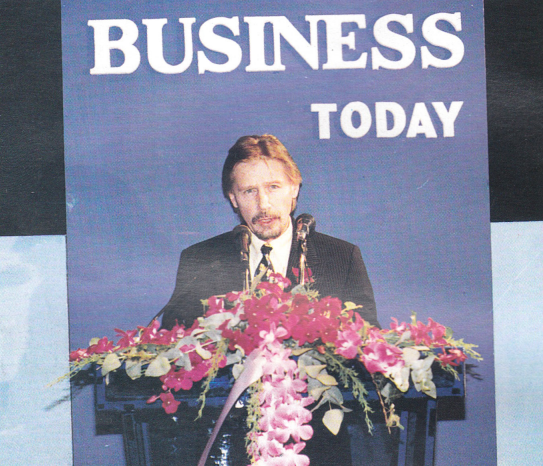
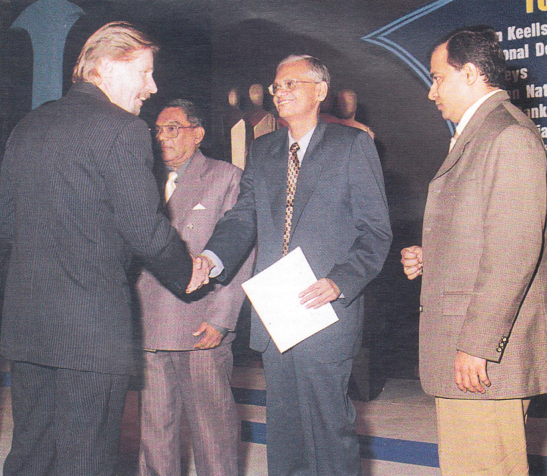
John Patrick receiving the award
‘The overall objective is obviously not just to win awards but to put business on at least an equal footing with potential competitors anywhere in the world.’
We are absolutely delighted to have been invited here tonight to receive one of Business Today’s top 10 awards. In the absence of our CEO Gotfried Thoma I am also very proud to have been chosen by my colleagues at CTC to represent the company on this prestigious occasion. In fact it is unfortunate that many of our top teams are unable to be here tonight as they are currently carrying out a series of presentations to a visiting consultant in Kandy.
I spent most of my career working for a number of manufacturing companies in various parts of the world and I can honestly say that rarely have I come across a company like CTC with such a passion and drive for being world class in every aspect of the business In order to benchmark or measure ourselves against other top blue chip companies, we certainly enjoy and revel in the friendly competition provided by such events like these. We don’t necessarily always win but competing and striving for improvement is important to us and not to mention lots of fun.
So this award is extremely welcome and is very gratifying to get outside recognition for the efforts that we put in. In our case, the award carries the financial year to the 31 of December 1997. But as with most accomplished companies standing still is really not an option.
Success depends on continuous improvement and CTC has been doing just that to streamline our business, has been ongoing and become a way of life and this is evidence by a number of awards been added to the company’s trophy table in the recent past.
Streamlining is been achieved through a radical reduction in our cost base through the disposal of underperforming assets, through improved manufacturing techniques and arguably most important of all through. looking after the needs and aspirations of our employees and through a companywide focus on the customer, on our distributors, farmers and our valued business partners.
The overall objective is obviously not just to win awards but to put business on at least an equal footing with potential competitors anywhere in the world. When international trade barriers around the globe are removed CTC will be ready. World class in the true sense of the word, top quality at the lowest cost.
We may have a little way to go but enormous progress has already been made and will continue to be made. Finally, to be counted among the other great businesses and the organizations invited here tonight and to share the same platform as them is a tremendous feeling and privilege and on behalf of CTC I would like to congratulate all our fellow award winners tonight and a big thank you to Business Today.
Speech by Amitha Gooneratne, Managing Director,
Commercial Bank
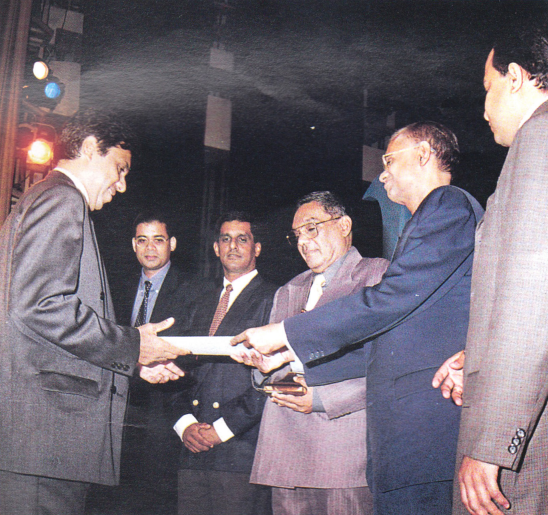
Amitha Goonerathne receiving the award
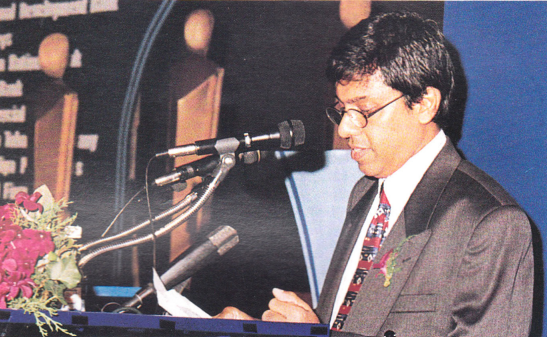
‘We have today the largest on-line real-time network of integrated branches and the largest ATM network in the country.’
I consider it a great honor and privilege for the bank to be ranked among the Top 10 companies in Sri Lanka. In two previous occasions too, Commercial Bank had been among the Top 10. Therefore, one can only surmise that there had been consistency in our performance. However, I wish to mention as I have done in the past that it would have been more meaningful if the companies had been assessed on their 1998 performance and not on 199 performances. It would be appreciated that the statistics relating to our 1997 performance are now historic but nevertheless, I am happy to state that 1997 was a good year for the bank and 1998 being even better. The bank recorded a pretax profit of Rs 652 million for the year 1997 as against Rs 580 million for the year 1996. It would be relevant to mention that the performance in the year 1998 was superior with the bank increasing its pre tax profit to Rs 769 million. We have therefore achieved pre tax growth rates of 15.7 for the year 1997 and 17.8 for the year 1998. Just a moment ago, I heard that there was no distinctive features in the performance of the Commercial Bank but I would like to mention if I may sight a distinctive feature it is a fact that the bank has achieved excellent capital adequacy ratios well above the stipulated norms which is an indicator of the bank’s stability and capability of withstanding adversities.
At a time when there is a crisis in South East Asia and in some parts of Europe, it is a great satisfaction to find that the bank is maintaining capital adequacy ratios well above the stipulated norms set for banks. Over the years, the bank has grown in size and stature expanding its branch network and becoming one of the technologically advanced banks in Sri Lanka today.
The bank has presently sixty-two branches and this number is expected to increase in the future. We have today the largest on-line real-time network of integrated branches and the largest ATM network in the country. We have today sixty three ATM’s situated throughout the island and most of the ATM’s are user-friendly having instruction screens in English and Sinhala. The bank was also the first to introduce tele-banking in Sri Lanka and also offers an easy customer access system whereby customers can manage their own banking operations from the convenience of their work places.
Apart from technology, the bank has also broken new grounds by offering 365 day banking at our Colombo 7 branch with the expressed intention of adding value to customer convenience. We will be constantly adding to our range of products with a view to achieve a wider customer base and in this context it is important to mention that the bank will be launching its international debit and credit card shortly.
Finally, I feel it’s appropriate to pay a tribute to our staff as it is their dedication and hard work that has contributed in the bank achieving greater heights in the last few years. In that respect, our board of directors must also be congratulated for their vision and guidance. I also take this opportunity in thanking the officials of Business Today in organizing this event, which is now well established and recognized in the business sector.
Speech by Moksevi R. Prelis,
General Manager/Director and Chief Executive, DFCC Bank
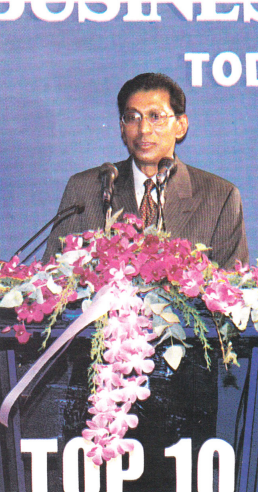
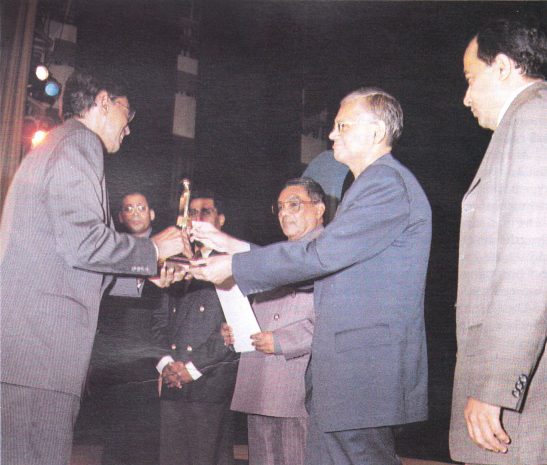
Moksevi R Prelis receving the award
‘We need new strategies and new game plans and organizational changes to face the changed future that we see.’
First I must take this opportunity on behalf of my bank to congratulate John Keells and its chairman Ken Balendra, its directors for achieving a well-directed number one position. DFCC is very proud to be associated with the John Keells group since the early stages of its conglomerate structure. I must also take this opportunity to congratulate our sister institution NDB for progressing upto the second position. We the DFCC Bank is pleased that we have progressed gradually from the first year, seventh last year, fifth this year. So we must be doing something right. It is perhaps a record for any country that two development finance institutions or development banks have consistently being among the Top 10 companies of the country.
I suppose this speaks a lot about the developmental role and the shareholder value in our country. To the other seven winners too we would extend our congratulations especially the two companies Maskeliya Plantations and Colombo Dockyard. We are very pleased that at last an engineering-oriented company has reached the Top 10, as industry is the backbone of a developing country.
Its somewhat distressing that in the colonial era that the Top 10 or perhaps the top three companies were engineering oriented companies. But unfortunately, they have declined and some are even non-existent today. So I hope that this will be a trend for the future that more manufacturing or engineering oriented companies will reach the top and displace some of these banks including ours.
Also I would like to express a special word of appreciation to the organizers of Business Today and its team for its initiative in launching this award in the first place and keeping it going for three consecutive years. We are also very pleased that some of the suggestions that we made last year has been taken cognizance of. Certainly, this award goes a long way as a recognition and a stimulus for good corporate performance in Sri Lanka. Finally I would like to thank the stakeholders of DFCC Bank, its valued customers, many of whom are here, its shareholders who had confidence and who really traded the largest number as we understand last year and the governmental authorities who supported us particularly in our development role and also our employees who were committed to progress not only of our institution but the fulfillment of our developmental mandate.
Last year was a watershed year for the Asian Region as well as for some other regions, was a year of turmoil in the economic field. It is true that Sri Lanka managed to avoid the devastation which befelled some of the countries. Mainly I would boldly say clue to prudent economic and fiscal management of the country.
Nevertheless it has to and it did have an effect and it will continue to have an effect on the economy of the country as well as its institutions and particularly on the financial sector. We in the DFCC realize that market condition, price competition, growth sectors. game plans in the finance sector as well as the players themselves and the role models will be different if not today certainly tomorrow. I think in this respect we echo the forecast expressed by Minister Kingsley T. Wikremaratne today.
DFCC, our board of directors and the management felt however successful and however comfortable in the past and however comfortable our position today, we cannot be complacent, we need new strategies and new game plans and organizational changes to face the changed future that we see. It is in this context that the DFCC decided to be a little pro active and refocus and reap our future for the next decade. In this endeavor, we consider that assistance from reputed consultancy organizations with wide international experience in this field is essential, with such assistance we have now refocused our strategies and plans. Broadly speaking our strategic aim at expanding upon our past successors and core strength aggressively entering and developing new markets, build and strengthen strategic alliances harness the synergies from these alliances.
Particularly I must mention the Commercial Bank of Sri Lanka which we are very happy and proud to note has consistently been among the Top 10 with us. As a starting point DFCC’s internal structures, systems and procedures, decision making processes, performance and reward systems will be changed to reflect the new strategies and international practices suitably adopted of course to fit our own needs. With these strategies and organizational changes we are confident that the DFCC Bank will enter a new century not only on a new cycle of growth but also be one among the next generation of financial institutions in our country.
Speech by Rienzie T Wijetilleke, Managing Director and Chief Executive,
Hatton National Bank
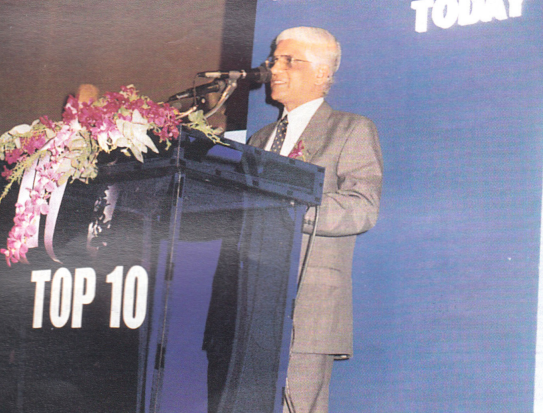
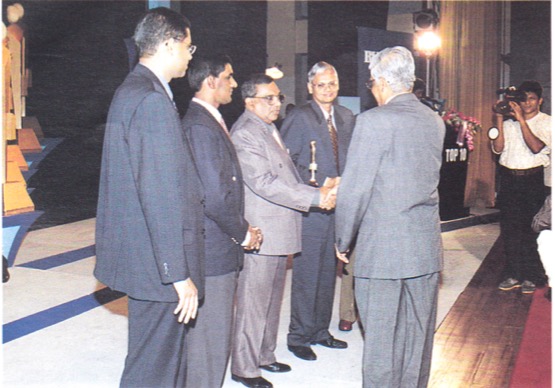
Amitha Goonerathne receiving the award
‘We have played a key role and taken the lead in innovative technology enforcing stringent standards of accuracy, security and reliability.’
Our bank now reaching the thirtieth year since incorporation has had a journey of continuous growth during this period. A few years ago Asiamoney magazine branded HNB as the flagship of the commercial banking sector in Sri Lanka.
A citation which had not been given to other banking institution before or after. We presently manage assets of over 67 billion rupees which is about USS one billion. In terms of assets we are the largest quoted company in the Colombo Stock Exchange.
We at HNB keep on asking ourselves the question can we in the corporate management team run this bank in the future as we are doing at present and in answer to this question we constantly address ourselves to the issues such as ensuring right organizational design, appropriate value and mindset in the organization. right people for the right job, systems procedures and processes always well positioned to execute present and future strategies, continued application of team spirit within the bank, innovative use of technology and most importantly to strictly follow ethical behavior at all costs.
In fact, in our latest annual report. there is a special chapter on ethical ethic, of management and I wish to quote a paragraph from that ‘improving the quality of management by introducing ethics in management is being savored today since hidden costs of customer dissatisfaction. employee defection, and destruction of investigations may increase funding costs arising from unethical management. This task requires changing of attitude geared towards earning a fast buck. By inculcating progressive values of honesty, responsibility and fairness. Total commitment of the corporate management is a vital component in this exercise as leading by example is more relevant in an integrity-based system. Adoption of a code of ethics for observance of all employees accompanied by audit and disciplinary mechanisms to ensure compliance would be a necessary starting point followed by staff training on ethics.’
HNB was one of the first financial institutions to set up a separate marketing department under a senior officer ten years ago. Emphasis today is on specific managerial skills such as selling and marketing. The main strategy of our bank is also to increase productivity, which will result in improving cost income ratio. The use of technology in this highly competitive environment also helps us in that direction. HNB despite being a fully privately owned organization has always had the national focus in all its activities. Most of our products and services are specifically tailored to meet modern needs of society, which in turn helps the country in its economic progress.
I would also like to make some general comments. You will note that five of the ten companies in this Top 10 category belong to the all-important financial sector. The financial sector is perhaps the most important artery or really the heart of modern economic life. The financial sector in Sri Lanka has gained sufficient strength to assist the government in its macro economic policies which seek to influence the main aggregate of the economy such as total supply and demand in goods and services, savings and investments, employment, foreign trade and the performance of our sector certainly has a bearing on containing inflation.
We, the commercial banks which are a major player in the financial sector has gained the strength to act as important financial intermediaries. We are the dominant holders of most of the assets in the financial system and also act as the custodians of the country’s wealth. The financial industry in Sri Lanka has proved this ability to attract capable professionals and experts for management. We have played a key role and taken the lead in innovative technology enforcing stringent standards of accuracy, security and reliability. Banks have been able to identify and analyze the current needs of information technology based on the country’s business objectives. The banking industry in Sri Lanka has the required compatibility and the combined local and international experience to take our country forward to economic stability and make it a key financial center in Asia.
I would like to draw your attention in the context of this situation to a major constraint our industry is faced with in its march towards further progress. I refer to the many statutes that are applicable to us which are completely out of date and irrelevant in meeting the modern needs. The Companies Act needs several amendments to make it more up-to-date. The Mortgages Act in its present form is not workable at all specially with regard to physical possession of securities. We have pointed out to the governor of the Central Bank the difficulties we have in certain sections in the Banking Act. For example, we are now called upon to provisions for interest as well as a part of the debt when such debt is non performing in three months period. Today no government department pays their dues in three months. Exporters have to wait for much longer to have their export proceeds. We are therefore compelled to classify many of our very good customers in the non-performing category and blacklist them after a period of three months, which is most inappropriate.
The Insurance Act and certain provisions in the Banking Act prevent banks from making investments in insurance companies. This is a very unfair situation. As we know globally most of the largest insurance companies belong to banks and vice versa. Today in Sri Lanka the state domination in the life insurance market with a 45% stake and general insurance with a 60% stake, has stifled effective competition as only 6% of the population has any form of insurance policy with them. We in the banks have direct access to the very poor sectors of the population to whom insurance cover is of utmost importance. We already have a relationship with this segment of the population and bringing them under some suitable insurance scheme will not need an extra effort on our part. This accessibility is not presently available to any of the present companies in the insurance business. Furthermore with the larger international correspondent relationship that we have, obtaining reinsurance from abroad is very easy for us because we already have very large credit lines with the best and strongest companies. We understand that the new Insurance Act is to be introduced shortly and we trust that it will open the doors for new entrants and establish a level playing-field. As we approach the new millennium, our bank will develop a very flexible organizational arrangement and ensure that we remain a leading financial institution in the country poised to continue the journey of prudent growth and strong commitment with social obligation. To conclude I thank Business Today for organizing this all important competition and making it possible for the corporate sector to display more and more transparency year after year.
Speech by Mahendra Amarasuriya, Deputy Chairman,
Hayleys
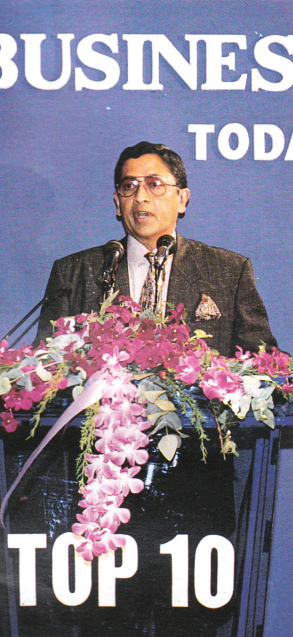
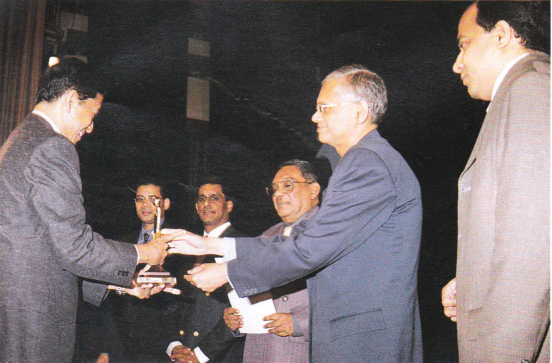
Mahendra Amarasuriya receiving the award
“Our response has been mainly on adding more value and diversifying product and searching for niche markets internationally.”
On behalf of the chairman, the board of directors and over thirty thousand employees working in all parts of Sri Lanka and overseas I wish to thank Business Today for continuing with their efforts to identify and recognize the Top 10 companies based on their financial performance for the third year in succession.
During the financial year 1997/1998 as mentioned earlier, from the top position we came down to the third position. In the last two years, our chairman and chief executive Sunil Mendis had commented on strategies which have helped Hayleys to become what it is today, one of the most diversified and largest conglomerates in Sri Lanka. The strategies were mainly the concept of adding value to our products, use to always talk from commodities to value-added products and more value added as we go along. The focus on human resource development where we considered our human resource to be the most valuable resource available to us and concentrating fortuitously in otherwise bright areas of business.
The philosophy of starting small and growing as we learn our businesses. Reinvestment in core businesses and existing from businesses which are non remunerative, outsourcing and subcontracting and continuously striving to change for the better and reaching out for excellence at all times.
He had also commented on the problems we faced in the last few years such as the overvaluation of the Sri Lankan rupee, the problem of smuggling, need for rationalizing the labor laws and the need for more balanced approach on environmental controls.
The economic scenario in 1999 appears to be not too buoyant, with economic growth projected to be around 4.5% GDP lower than 4.7% in 1998 and 6.3% in 1997. Unfortunately exports are showing a continuous decline. Plantations are very adversely effected with the slump in tea prices and continued slump in rubber prices and some plantations at present are unfortunately even recording losses. The budget deficit as you know which increased from 7.9% in 1997 to 9.2% of GDP in 1998 will perhaps increase further and will result in upward pressure in inflation. Furthermore unfortunately for the business sector, 1999 being an election year will have a disruptive and adverse impact on our economy.
For us the main challenges facing the private sector and specially Hayleys in 1999 have been and is the greater impact of the East Asian economic crisis on Sri Lanka’s economy. The crisis about which we did not take much cognizance saying that it will not effect our economy when it came about in 1997 is now certainly effecting our economy, especially in value-added exports. Because we are getting very fierce competition from South East Asia or from East Asia as a result of the dramatic depreciation in their currencies making them far more competitive in a number of industries for instance even in garments in which they were not even Sri Lanka’s competitors in our areas prior to the crisis.
Hayleys group is also adversely affected in most areas specially in regard to marketing of rubber gloves and activated carbon by Haycarb in addition to having aggressive competition in the field of dyed fabrics where discounting of prices from the East Asian countries has had a severe impact on our profitability. Furthermore freight costs increasing will impact seriously on some of our exports and of course the Ruble crisis goes on and will have a negative impact on tea exports and domestic demand for goods and services also appear to be sluggish. Our response has been mainly on adding more value and diversifying product and searching for niche markets internationally. Maintaining quality standards at the highest possible level closely monitoring our working capital requirements and restructuring and existing from non-productive activities.
I would also like to express our views on some major issues which will impact on the private sector or particularly on Hayleys where we request the government to help us and assist us. The overvaluation of the Sri Lanka rupee has continued to be a matter of great concern to exporters. Although the commodity boom which benefited tea exports in 1997 and 1998 masks this problem, it’s impact is becoming very serious specially for exporters of value-added products like Haycarb. East Asian currencies depreciated as you know by around 35% to 55% against the US dollar in 1997 and although we recovered marginally in 1998 and 1999 they still remain at levels far below those at the onset of the East Asian economic crisis whereas the Sri Lankan rupee depreciated by around 8% in 1997 and around 10.5% in 1998. This has exposed our value-added products to tremendous price pressure and even resulted in our losing well established export markets in which we were thriving earlier.
Secondly we feel there is a need for a reform in taxation for the benefit of the domestic trading businesses. We feel that tax authorities should allow business expenses, which are non tax deductible now to be deducted. The most anomalous area is the national security levy, a part of which is deductible while a part is not. There appears to be no logic whatsoever in this decision. We also hope that the government will provide low taxation rates previously committed in a previous budget.
Thirdly there is a very urgent need for reform and rationalization of Sri Lanka’s labor laws. The application of which results in very low productivity far below the levels of our competitors. The more serious concerns are the provisions governing the termination of employment, subcontracting and the excessive entitlement of holidays and leave which has resulted in Sri Lankan workers effectively working only two hundred and fifty days in a year of three hundred and sixty five days. Finally we feel there is a prime need of government support for agriculture based industries similar to incentives provided elsewhere in South Asia. This is an area, which can provide significant employment opportunities direct and indirect if supported by the government.
I would also like to make a suggestion to the organizers of this event. The Top 10 companies recognized today is on the basis of their performance in 1997/1998 which financial year ended more than one year ago and we have completed one more financial year 1998/1999. First the recognition is more than one year late. Secondly a situation can arise in the future where a company included in the Top 10 could well be on a declining trend during the next financial year. Thereby questions arise regarding the ranking of Business Today. Therefore it will be more appropriate if the assessment is possibly done within six months of the close of the financial year. As we enter the new millennium our group of companies will have to face new challenges, overcome far more difficult obstacle and reach higher heights in our endeavor to ensure development and growth of our company. We are thankful for Business Today for having organized this competition which will motivate all our people to perform even better in the future.
Speech by Ranjit Fernando, Director/General Manager,
National Development Bank
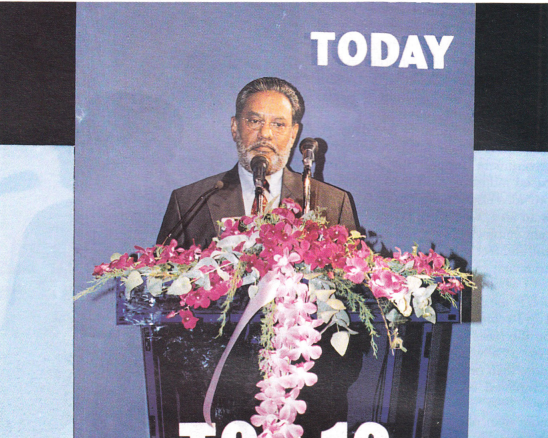
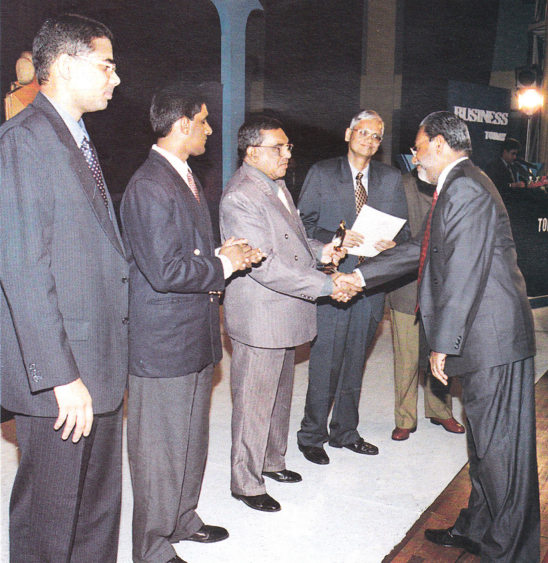
Ranjit Fernando receiving the award
‘While we are justifiably elated with this position, we are also conscious of the challenges the new millennium faces and presents to us.’
As a company who has been in the stock exchange for only five years and being under government ownership for fifteen years, we are justifiably elated and I think it signifies the good that can be done by moving away from government ownership and coming within the rigor and discipline of the market. the competitive spirit in the market which could be unleashed by companies moving into private ownership.
I think I must make a correction that Dockyard and Maskeliya Plantations may be the second and third companies to enter the Top 10 as privatized companies. The NOB has been the first because we have been in the Top 10 for the past three years. Any change in ownership is traumatic and change is difficult. Therefore, the recognition that we received today is also significant and signifies the immense challenge that the staff of the bank has gone through boldly in making the change from that government ownership and all the constraints that it brings about into a market oriented institution serving the clientele of the hank.
I recall when we were selected number eight or seven in the first occasion when this event was staged, I made a plea that the organizers should be more transparent with the criteria used in making the selections. I am very happy that the organizers have heeded that request as well as other changes that was suggested by us in organizing this event and in making the selections. I believe it will also be advisable to further improve the transparency by disclosing the weightage attached to the factors as well as listening to the criticisms that may be made by the participants. I don’t think you should be deterred by that because in a democratic climate that we live in criticism is their right and it is your prerogative on the other hand to listen to the criticisms and use your objective criteria so that this event and this selection becomes more prestigious as the years go by. From the point of view of the NOB, while we are justifiably elated with this position, we are also conscious of the challenges the new millennium faces and presents to us.
Development banks as Prelis mentioned, the two development banks in Sri Lanka have occupied positions in the Top 10 consecutively in the three years this event has been staged. As the World Bank review report for the country stated last year, these two development banks may be just a few among the development banks in the world which have operated viably and exemplarily in the countries where they exist.
Most development banks have now gone in the path of the dinosaurs. because of one reason. Development banks were created in a period. When governments thought that they were responsible for development and they were the principal force of development. That view has changed, when that view prevailed governments created, fostered and backed institutions like development banks which played a role in the government helping in the process of development and fueling the process of development. And in that era, governments owned development banks. But that has changed, governments today believe that the private sector should be the engine of development in a country.
The role of the government today is confined to maintaining law and order and also maintaining the climate for growth, the macro economic conditions for growth. In that context governments have disowned development banks and development banks that have recognized that and changed their focus from a single product organization to becoming universal banks serving clients in their widest needs have survived and we occupy this position today because we have recognized that fact and I hope that the government facilitates that change. Rienzie Wijetilleke referred to some of the changes that are necessary.
I do believe that an enlightened government would facilitate that change and help the development banks to become more meaningful institutions in the future so that they would serve the community and the country better in the future.
May I take this occasion to thank our take holders. our shareholders, the board of directors and most of all, the employees as well as the customers of the bank who have continued to patronize the bank and have confidence in the development of the bank. I also wish to thank the organizers for continuing this event and wish them a better organized and a much more prestigious event as the years go by.
Speech by Ken Balendra, Chairman,
John Keells Holdings
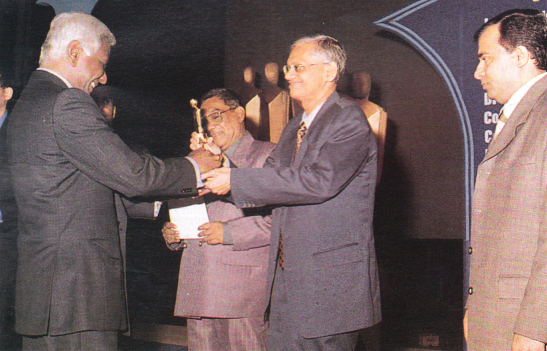
Ken Balendra receiving the award
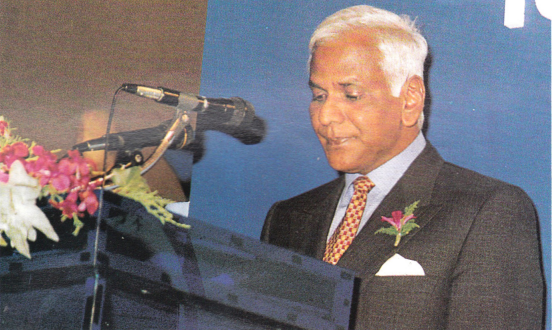
‘We have to increase the power and independence of the public service, the judicial service commission, election commission and the police force.’
Rarely have I heard so many distinguished people speaking to such a distinguished audience in one sitting. On behalf of all of at John Keells, over forty thousand people let me place on record our thanks for and appreciation of the management of Business Today and its selectors for selecting us into the number one slot. The strength of any company in the future will as I always said firstly. Secondly and thirdly be its people. I’ve amended it slightly in my old age, I now say that the strength of any company will depend on customer oriented, technology driven people who strive to increase their shareholder wealth. firstly, secondly and thirdly that’s the future. I am mostly delighted that all Top 10 in the list today are friends. I happen to be in the board of directors in three companies, we have joint ventures with another, we bank with all the banks. All of them are very close friends showing what a small village we live in.
It had been touched on earlier but the signs in regard to the macro economic environment in the country for the years 1999 and 2000 are not certainly encouraging. Unfortunately there is little influence that a comparatively small economy such as ours can have on global trends. There’s nothing we can do about the East Asian crisis, we cannot prevent India and Pakistan blast nuclear weapons, all those things are outside our control. While accepting that we are in a global village where we can foresee difficult external trends, it is time for all Sri Lankans in business, politics and any area of activity to unite in controlling internal self-imposed burdens on the economy to mitigate the overall impact. This is where the challenge lies. Not only for the private sector but also for the government. The business community has repeatedly pointed out we have several problems on our hands, which we can control within the scope of our country. The first one is the much talked of North-East crisis; I keep talking about that. It has left the social fabric of our nation in tatters. We are busting up something like 50 billion rupees or 5% of GDP on the war – a senseless one. The resolution of this conflict will open up the economy of this country to an extent that we can really sprint towards the NIC status – so we live in hope in regard to that.
Also the stringent labor regulations which was touched on. We have to take a bipartisan approach not only in regard to the North-East crisis but in regard to common areas such as agriculture, industry, trade and commerce without short-term political or financial gains. We have to increase the power and independence of the public service, the judicial service commission, election commission and the police force. Interference in the police service for instance by politicians has resulted in lawlessness. In the meanwhile the police service has amply demonstrated that devoid of political interference it can indeed be effective in ensuring law and order. Educational reforms with special emphasis on English and computer literacy to meet the demands of a technology driven economy in a global village. Formulation and speedy implementation of national economic plans in consultation with all relevant parties.
Over and above what I have said, several areas of physical infrastructure which is a prerequisite for economic development either have been or are been addressed at too slow a pace through the participation of the private sector. The development of the road network is unlikely to attract private investment, so therefore there is an urgent need for the government to intervene in this vital, area of infrastructure. One of the problems we are creating for ourselves is the current prospect of having a series of elections drawn out for almost two years whereby decision-making will come to a standstill. In conclusion, it is not my intention to put the world right here today. I believe you have read the latest Business Today which has a very comprehensive interview with me. All I have to say is thank you to all of you. We are very obliged.
Speech by G L Peiris, Minister of Justice, Constitutional Affairs, Ethnic Affairs,
National Integration and Deputy Minister of Finance
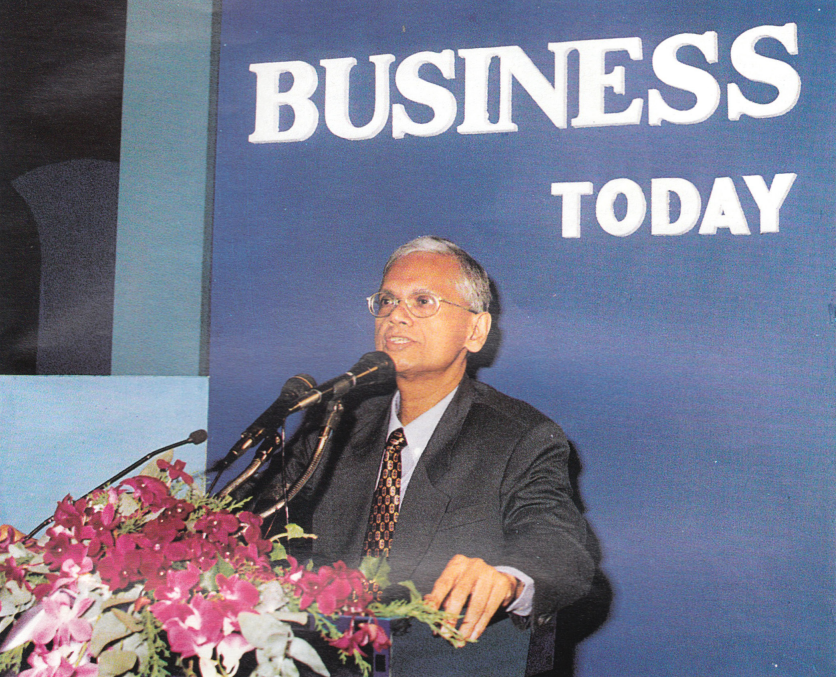
‘We have people who have achieved the pinnacle, the very zenith of excellence in all walks of life.’
May I begin by congratulating the officials of Business Today on a number of counts. First and foremost they had the vision and the foresight to decide upon this very appropriate method of strengthening and energizing the private sector. Honor to whom honor is due is one of the basic tenets of our civilization. Business Today has decided to confer these honors on the highest achievers of the corporate sector in order to instill standards of excellence in our community, to spur others on even greater heights of achievement and thereby enrich not merely the private sector but the Sri Lankan community in general. That I think is the first reason why Business Today needs to be commended.
Secondly they have shown the merit of consistency. In our country all too often it happens that enterprises and ventures can be commenced but very often we run out of steam and we find it difficult to maintain what we have initiated or commenced. That happily has not been the experience of Business Today. They have been able to continue this for three years and I am particularly appreciative of the honor they have bestowed upon me by inviting me to share this occasion with you on all three times.
Thirdly Business Today has set out very objective criteria on the basis of which there has been an assessment and a critical evaluation of performance. There had been no scope for arbitrary or capricious judgement. It has not been a question of subjective or idiosyncratic appraisal. They have laid down clearly and specifically the yardsticks by reference to which performance will be assessed and that has enhanced the value of what we have attempted to do. Eleven criteria have been spelt out very specifically.
Finally Business Today has had the courage to embark upon this project in a spirit of self-criticism, have learnt from their mistakes. They have taken into account constructive criticism. They have modified and added to the criteria as they went along. This year they have added two criteria which are of particular relevance, namely value-addition and social responsibility so on all those accounts I think Business Today deserve to be commended very warmly and sincerely for what they had to offer to the corporate sector in particular.
I think it was Maxi Prelis who referred to role models, I think that is an integral part of the objective of this exercise. To establish role models which can be emulated by others in our community. If we are to take that exhortation seriously I think it is appropriate on this occasion to focus upon some of the perceptions and ideas that are reflected in the interviews that are published in Business Today. I glanced at the contents of some of the interviews and rather than talk to you about my own ideas I think it would be much more useful and much more interesting to try to extract from those interviews given by the highest achievers whom we are honoring this evening, their own priorities and their own explanations on the success as to the secret of the success which we all unequivocally acknowledge and pay tribute to this evening.
Let me start with Ken Balendra, chairman of John Keells Holdings who has pride of place this evening having been selected for the first slot. I think the most important comment he has made in the interview which he gave is the pointed reference to team performance. Ken Balendra has told us that in his judgement the principal reason for the phenomenal success of John Keells Holdings is that forty thousand souls have been able to work together creatively, productively and constructively as members of a team. He has paid the most emphatic tribute he can to the excellence of the team which he has the privilege to lead. I think that is a very important point for us to note in Sri Lanka today. Our country is not short of talent. We have people who have achieved the pinnacle, the very zenith of excellence in all walks of life. Not only in this country but abroad.
However we sometimes find it difficult to work cordially together as members of a team. I don’t think anybody will misunderstand me if I say that the prima donna complex is something that needs to be identified as a negative aspect of our culture. So there I think Ken Balendra has hit the nail on the head. A company of his size cannot achieve this kind of excellence if they rely solely upon the merits and the talents of a few individuals. It has all to be welded together, it has to be integrated and coordinated. And the team spirit which we have referred to I think is critically important consideration.
The second point that emerges from the views expressed by Ken Balendra is that of humility, he says in his interview that he was asked by the chairman of another large company how he has managed to teach so much to the people who work under him.
Ken Balendra’s reply was not that he teaches them but that he learns from them. They teach him because they engage in a wide variety, a whole plethora of activities. What stands out clearly in the interview given by Ken Balendra is the attribute of organization. In that interview there is a very clear description of the structural organization of John Keells Holdings. He says that there are eight members of the main board, six of them are heads of division, he meets them every week. At the end of the month there is a very clear appraisal of performance. On the fifteenth of the following month the final accounts are ready. So it is a case of constant monitoring of performance, which he rightly identifies as one of the primary explanations for the unprecedented success, which has been achieved by his company. I’m telling you this because I think it is more important for you to distill the essence of what is contained in those interviews, reflecting the thoughts and the aspirations of the leaders of the corporate world that we today pay homage to.
For the NDB, Ranjit Fernando emphasizes consistent focus strategy. It is the principal theme that pervades in the interview given by him. Consistency I think is the most important idea that permeates what he has said. If there is a constant shifting from week to week and so on, then your goals and objectives are certain to elude you. Consistency with regard to priorities and strategies, a coherent attitude to the work of one’s company is I think a principal ingredient of success in the highly complex world that we live and work. He also says that at the end of the Second World War when development banking came into being it was a very different scenario. It was remarked this evening as well. He pointed out to you the dominant role of the government in the socio-economic environment of the world at the conclusion of the Second World War. As the world changes there must be flexibility and resilience, the capability and the potential to adopt to a rapidly changing cultural and economic environment.
He attributes the success of the DB to be inherent potential of his bank to react in that way with imagination, perception and sensitivity to a rapidly changing external environment. Also reflected in that interview is the perennial concern of the NDB about social responsibility. He points out that the NDB was very much involved in the promotion of information technology in the schools. He also emphasizes the contribution of the NDB towards the hospital system and health care delivery in this country. The DB has endeavored to raise fifty million rupees to support health services in Sri Lanka.
For Hayleys the interview was given by the chairman of Hayleys, Sunil Mendis who talks on new challenges. If a company is to pro per and to achieve the kind of success that is worthy of recognition then you have to be innovative in your thinking. The tried and tested methods of the past will not suffice, you have to blaze a new trail and that is what Hayleys has done. One must recognize constraints without being captured by those constraints. Sunil Mendis relates how Hayleys from very modest beginnings of Charles P. Hayley has achieved its present dominant position. He shows how there has been a very significant erosion of the profits of Dimo, because of the rapidly increasing interest rates. But not withstanding all those obstacles and inhibitions he points out how Hayleys have been able to evolve an internal strategy to overcome those obstacles and to reach out the greater success as Hayleys went along.
Rienzie Wijetilleke of HNB has stressed the importance of competition. If there’s no competition there’s no spur for achievement. In a highly protected environment there is no reason to excel. Competition therefore provides the essential stimulus for the achievement of excellence. That point is very persuasively articulated by him. There is also a very touching response he has given to a question that was asked. He was asked you are today so much associated with HNB, what happens when you move out. This again I think is very much part and parcel of the national scene.
Today all our institutions are dominated by powering personalities. Whether you speak of the private sector, non-governmental organizations, banks, politics, commerce and trade very often the whole stature and the reputation of an institution is founded upon the bedrock, the solid anchor of the personality of a human being. I don’t think there is necessarily anything wrong with that. But the very criterion of this stability and the depth of one’s contribution to the institution that one has built up is the conviction in one’s own mind that one has built up a team which can carry on one’s work when one is no more. That attribute of continuity I think is one of the essentials of nation building and institution building in our own cultural context. That comes up very forcefully in the observations of Rienzie Wijetilleke when he says no he has made his own contribution to the development of the scales of a team which is today adequately equipped to carry on the work which he has commenced and continued in such exemplary fashion.
The last interview I will focus upon is a comment by Maxi Prelis on behalf of the DFCC Bank who talks of new strategies. All innovative concepts enable the private sector to enjoy access to international capital market in order to collaborate with the state with regard to the development of the infrastructure in our country. Maxi Prelis also points out that fierce competition is a reality of the world in which we live. He says their fund management company NAMAL has to compete in a daily basis with other institutions which are equally strong and it is in that kind of atmosphere that they have to wry for success and that is one of the main features of the performance of the DFCC Bank. I do not think there is anything that can be regarded as a substitute for individual performance.
A government cannot impart to the private sector the strength that it does not have. A government can only try to make it possible for the private sector to achieve maximum results utilizing the potential that is already inherent in the private sector. The private sector in our country does have that potential. The role of the state is ancillary and supportive. The state can only offer an enabling and facilitating environment in which the private sector can achieve the highest conceivable standards of excellence. That is what our government under the leadership of Her Excellency the President Chandrika Bandaranaike Kumaratunga has clone.
As my colleague Hon. Kingsley T. Wickremaratne pointed out to you a little while ago. I would like to identify five principal contributions which our government has made to the engendering atmosphere that is conducive to the performance on the part of the private sector. First and foremost as the president of the World Bank and the managing director of the IMF explicitly conceded in Washington two weeks ago Sri Lanka’s ability in a relative sense to withstand the negative fallout from the East Asian crisis was imputable in the final analysis to political stability and social tranquility. Those are not developments that occur fortuitously. It is because of policies, which are consciously and deliberately formulated and put into place that we have been able to assure this country the degree of political stability and social tranquility, which has won such warm praise and commendation.
Secondly our government has placed at the disposal of the private sector fiscal and monetary incentives that have spurred the private sector on to achieve what has been described to you this evening. Of course when you give tax concessions revenue falls and there is a problem about the overall budget deficit as a proportion of GDP.
But government policy is all about social engineering. There are situations in which you would be prepared to take a cut in revenue in order to confer much more substantial advantages upon the private sector and through the private sector upon the community in general. It is upon a critical appraisal of a variety of competing considerations that Her Excellency has adopted this course of giving the private sector structured, measured and balanced incentives which are in considerable part responsible for the achievements which we speak of today.
Thirdly as Ken Balendra pointed out it is the duty of the government to focus very sharply upon the development of physical infrastructure that is exceedingly important in the highly competitive world in which we all have to operate today. Two weeks ago when I discussed the very subject with the new president of the Asian Development Bank, he assured me that the bank was committed to very strong support for the development of a shoreline highway linking Colombo with Matara. That is a project the total volume of which exceeds even the Mahaweli project and since private sector involvement does not seem very high in that particular area, the government has to explore alternative sources of funding and that was the pit and substance of the negotiations which I conducted on behalf of the president with the Asian Development Bank.
Fourthly the government has contributed to the success of the private sector by enhancing the quality of the human resources in our country and that is the objective of the educational reforms which we are now putting into place. Fifthly and finally, the government has contributed to the corporate well-being of the private sector by laying down transparent and definable procedures in respect of the award of contracts, decisions with regard to tenders, transparency with regard to a whole variety of procedures which are essential for the proper performance of functions which are integral to the private sector. In all of those five areas, the conscious and deliberate policy of our government has brought about a state in which the private sector is encouraged to utilize its fullest for the benefit of our country.
And all that I have to say in conclusion is that, Business Today and its leaders and all those who have been associated with this enterprise has done this country proud.
